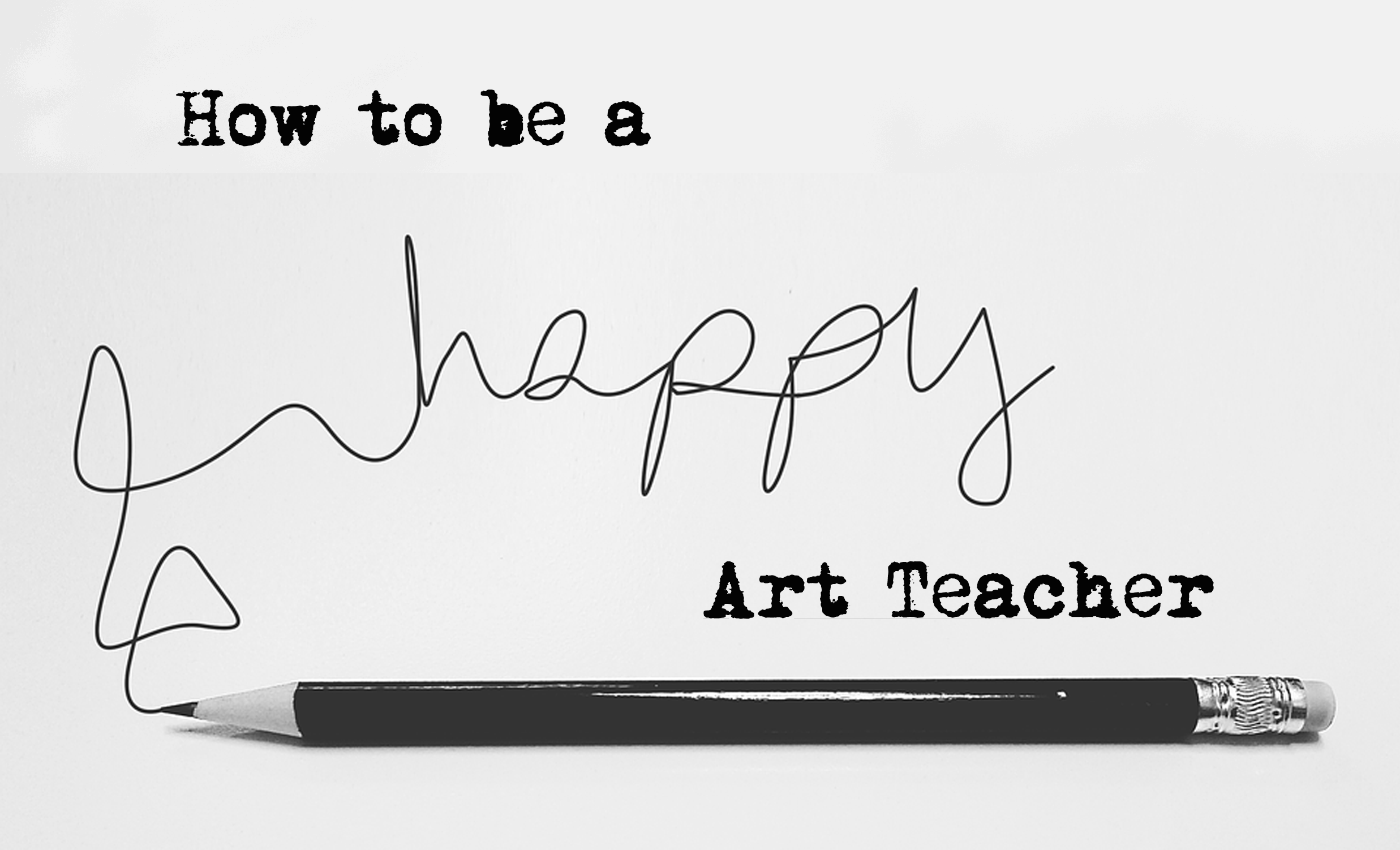
How Planning & Reflection Is Key To Happiness
This blog post offers practical ideas for how to be a happier Art Teacher. You used to love it right? You did all that training to become an Art Teacher with such enthusiasm, but now you don’t feel all that happy. You may have found last year incredible difficult. Or you may love your job but still get that feeling of dread before we return to school. Now is the time to reflect and plan for a happier year ahead.
Get Planning. So you’ve been teaching for ages and you know how to wing it, don’t you? You can teach the same projects and walk in on the first day and everything will be ok, won’t it? Errr…not if you want your teaching to be fresh and exciting, and not if you are a ‘reflective practitioner’. I want to tick both of these boxes. Admittedly I’m a bit of a geek and quiet enjoy planning. I like to plan new work and adapt old work. I am self-critical and like to improve what I’ve taught in the past. If you are willing to spend some time planning you can ditch what was less successful or what you are bored with and pass on your renewed enthusiasm to your students. This means happy students and happy art teacher.
Plan a ‘Wow’ lesson. Sometimes I teach a lesson and it leaves me on a high. There’s a real buzz about it – you feel you’ve really stretched your students, there’s been great discussion, you feel it’s a model lesson and wish it had been observed (almost). You may  have tried a new strategy that you’ve been keen to try, and you’ve passed that enthusiasm onto your students. (There’s that word ‘enthusiasm’ again). But let’s be realistic, not every lesson can be like that for a number of reasons. You’d burn out to start with, and sometimes you just need students to get on with it. My suggestion is to make sure you have at least one ‘Wow’ lesson a week, and that you make sure your different classes benefit from it. This way you’ll stay engaged with your job and the strategies you try with become part of your everyday practice. Of course, engaged with your job means happy art teacher!
have tried a new strategy that you’ve been keen to try, and you’ve passed that enthusiasm onto your students. (There’s that word ‘enthusiasm’ again). But let’s be realistic, not every lesson can be like that for a number of reasons. You’d burn out to start with, and sometimes you just need students to get on with it. My suggestion is to make sure you have at least one ‘Wow’ lesson a week, and that you make sure your different classes benefit from it. This way you’ll stay engaged with your job and the strategies you try with become part of your everyday practice. Of course, engaged with your job means happy art teacher!
Plan to Reduce Workload. It’s only at the planning stage that you can really reduce workload. If you consider what homework you are going to set and how it is going to be  marked you can save hours and hours of work throughout the year. Are you going to mark it, or is it going to be peer or self-assessment? If so, how? I have a free resource of homework ideas that don’t need marking here. I literally look at all the homework in a unit of work and highlight the ones that will need marking and plan alternatives if necessary. It doesn’t stop there. What about the class work you set? Three drawings can be done on three separate pages and all require marking, or three drawings can be done on a well composed double page spread which looks better and only requires one lot of marking. Genius!
marked you can save hours and hours of work throughout the year. Are you going to mark it, or is it going to be peer or self-assessment? If so, how? I have a free resource of homework ideas that don’t need marking here. I literally look at all the homework in a unit of work and highlight the ones that will need marking and plan alternatives if necessary. It doesn’t stop there. What about the class work you set? Three drawings can be done on three separate pages and all require marking, or three drawings can be done on a well composed double page spread which looks better and only requires one lot of marking. Genius!
Classroom Management. You should never find yourself at the end of a lesson with loads of tidying and cleaning up to do. If you do, it’s down to your own bad classroom management. (Ouch! Blunt, I know!) You have an army of helpers every lesson and you need to train them to tidy up after themselves. Yes, it’s relentless. Yes, you’ll sound like a broken record, but it’s got to be done. Set out the rules at the start of every year. Take the time to teach your students how you like things done. This should appear in your lessons plans as different lessons may require different routines. Once you have your students doing all the work for you, you’ll feel a sense of satisfaction, and yes, happiness!
Create Independent Learners – not a rod for your own back. Do you want to do the work for your students, running yourself ragged in the process, or teach them to do it themselves? Silly question really. I’ve worked in different settings and seen some odd practice from teachers and lazy learned expectations from students. If you start doing the work for them, even if this starts as a demonstration, they will expect this and you create a hectic lesson where not much teaching goes on. Demonstrate on a piece a paper where possible, and if you have to work on their work, make it the smallest amount to show the technique. Guidance can come in the form of whole class demonstrations, written week by week expectations which you can refer them back to, Youtube videos and handbooks. Help them to help themselves, in the long run it will make your life easier.
Make Your Most Challenging Student Your Project, not your Problem. Your student may be challenging because of behaviour or because of ability, either way, you’ve got to deal with them. Speak to colleagues, read books or blog posts, speak to your school specialist if you have one, ask for advice from FaceBook groups like #ArtTeacherProblems and come up with a list of strategies. As soon as that student (or students) are a project and not a problem you will feel more able to cope. Try each strategy, one by one. If you have a plan, you will feel positive.
Practice Positivity. I’m a great believer in practicing positivity. For many of us, it is  something that needs to be consciously practiced. I write down three positive things about each day. Not just about teaching but my whole life – but I’m often writing about my teaching – a nice comment, a great piece of work, a fantastic lesson. You will be amazed what a positive effect this simple action can have. Try it, I dare you! For more ideas on positivity click here. If you feel you are not coping, speak to someone at your school, a job shouldn’t make you feel like that and your school has a responsibility to support you.
something that needs to be consciously practiced. I write down three positive things about each day. Not just about teaching but my whole life – but I’m often writing about my teaching – a nice comment, a great piece of work, a fantastic lesson. You will be amazed what a positive effect this simple action can have. Try it, I dare you! For more ideas on positivity click here. If you feel you are not coping, speak to someone at your school, a job shouldn’t make you feel like that and your school has a responsibility to support you.
If you have any ideas to share of how to make an Art Teachers life easier or happier, please comment below.



